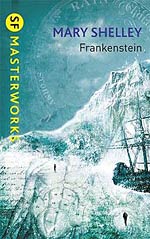
![]() Zoori
Zoori
3/17/2013
![]()
Frankenstein; or, The Modern Prometheus is a novel written by Mary Shelley.
I believe that starting my WoGF readings with Frankenstein by Mary Shelley has been a logical choice in terms of chronology of the genre: this book is considered one of the first modern science fiction novels. It has also been practical, since that was the only unread SF/F woman writer in my personal collection (until I have learnt of WoGF). Starting my WoGF reviews with a world's classic horror story is challenging. Who has not heard of Frankenstein or seen one of its many adaptations in popular culture? The name has become part of English dictionary meaning 'a person who creates something that brings about his ruin' contrary to the common confusion of the name with the actual monster. However, how many actually know it was written by a woman author? Or that it was first published anonymously in 1818?
It is a story of Victor Frankenstein, a young, bright and ambitious scientist, who creates a living being in his laboratory. Only after witnessing the awakening of the monster does he realize the madness and horror behind this act, and escapes his creation only to become haunted by it. Gradually not only his sanity but also his personal life gets ripped to pieces by the consequences of such action, in the end turning into a deadly chase. The question is: who is the actual monster?
The main theme and the center of the book is the relationship of the creator and its creation and creator's responsibility for his creature's actions, their dependency on each other. The creator (Victor) escapes from his monster and expects it to perish, refusing to take consequences for his own actions. However, the monster lives and learns to survive on his own. First of all, he learns to sustain his physical needs. Soon afterwards he learns of his alien nature: because of his deformity, the society rejects him and despises due to prejudice without giving him a chance to prove them wrong. The creature understands he is the only one of the kind, 'a fallen angel' who was abandoned by his creator, and that leads to his anger towards all human race and a will to revenge himself against such ignorance. This rejection and his loneliness is a cause of the character's ruin.
'Frankenstein' has various literal references to 'Paradise Lost' and the creation of the first man, the parallel to Prometheus who stole the light of knowledge from the Gods, which help understand the story.
When I first of all started reading the book, I had to get used to its epistolary form which is not too common to a modern reader like myself, however, eventually the reading becomes very awarding because of its the personal and close account of events. What I particularly enjoyed about the story is that it is made of several layers: it is a story of a story within a story. It starts with a narration of Robert Walton who goes into an expedition of discovery to the North and meets Victor Frankenstein. Victor tells his own experience including the narration of his creature from the first person's point of view. This way in the absence of a single omniscient narrator, the story is displayed from three different perspectives. On the other hand, this reduces the actual credibility due to the subjective point of view of all of its narrators.
It has been a wonder to read such a story when I thought I knew all about it, and how it was going to end, nevertheless, I have discovered that Frankenstein is not only a story about the creation of a monster, it is a tale of a development of self-consciousness, integration to the society and its influence to an individual, a search for origins and meaning of existence.